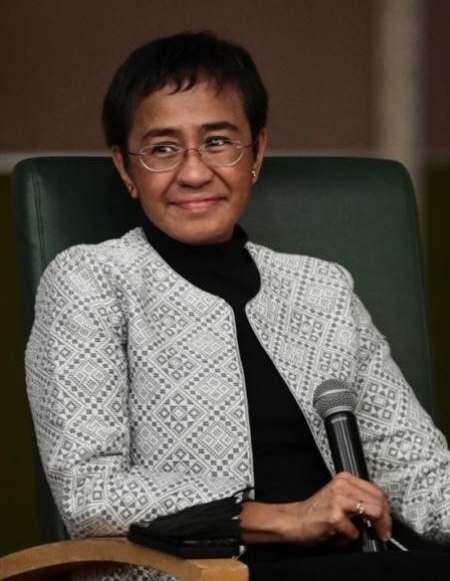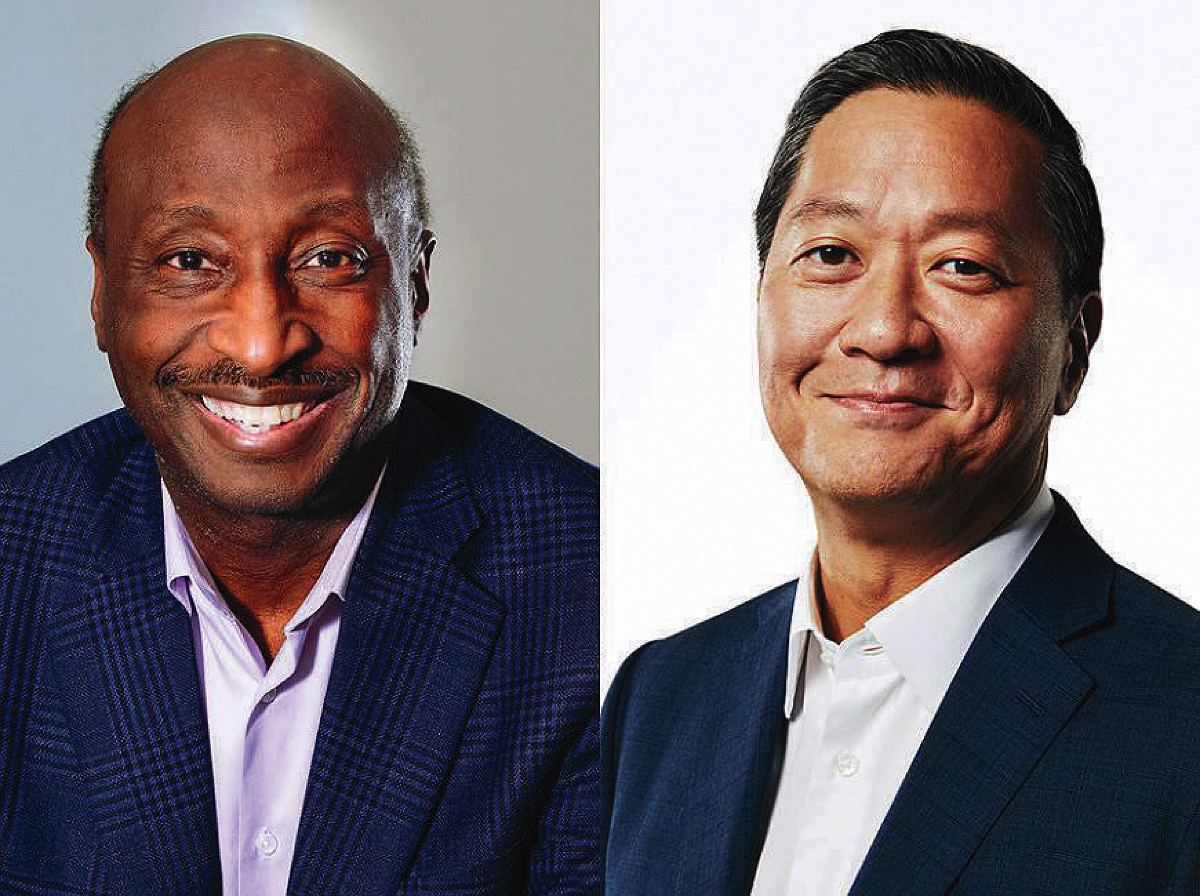
Headliners
The guest speaker during Harvard’s May 23 Commencement exercises will be Maria Ressa, who shared the 2021 Nobel Peace Prize for her brave, independent news coverage of her native Philippines. During the authoritarian administration of President Rodrigo Duterte, she became a fierce critic of the corrosive effect of social media on civic life and democratic governance. Read more at harvardmag.com/ressa-speaker-24.…The Radcliffe Institute’s honorand the next day will be Sonia Sotomayor, an associate justice of the Supreme Court of the United States since 2009. A graduate of Princeton and Yale Law School, she vividly described her experiences as an undergraduate early in the era of affirmative action in My Beloved World (2013). Sotomayor wrote a powerful dissent from the court’s ruling last June in the cases against Harvard and the University of North Carolina that outlawed the consideration of race in admissions (see “After Affirmative Action,” September-October 2023, page 14).
Aid Advancement
Harvard Law School has launched its Opportunity Fund, through which students in the class of 2027, entering this fall, with the greatest financial need may qualify to attend tuition-free. According to the school’s announcement, “it is expected that many who qualify will come from families who have income at or below two times the federal poverty line” (which is $31,200 for a four-person household).

New Fellows
Kenneth C. Frazier, J.D. ’78, and Joseph Y. Bae ’94 were elected Harvard Corporation fellows on February 4. Frazier, former chairman and chief executive officer of Merck & Co., the pharmaceutical company, and now chair of health assurance initiatives at the General Catalyst venture capital firm, succeeded David M. Rubenstein, who stepped down at the end of June 2023. Bae, co-CEO of Kohlberg Kravis Roberts & Co., the global private equity firm, succeeds Paul J. Finnegan ’75, M.B.A. ’82, who ceded his role as University treasurer last year and concludes Corporation service June 30. The new fellows, their Corporation peers, and the Board of Overseers face a particular challenge in identifying a new Harvard leader to succeed President Claudine Gay, who relinquished the office on January 2. Read more at harvardmag.com/fellows-24.
Endowments Decoded
The NACUBO-Commonfund annual report on endowment data reveals how Harvard’s endowment ($49.5 billion, excluding pledges) lags far beyond other schools’ when measured per full-time-equivalent student. Princeton tops the ranking at more than $3.8 million per capita, followed by Yale (about $2.8 million), and Stanford (about $2.1 million). Harvard and MIT are nearly tied at just more than $2.0 million per capita. In terms of spending power, the endowment tally is revealing. And although Princeton’s engineering and applied sciences faculty, for example, is larger than Harvard’s, sans a medical school and with a smaller wet-lab faculty overall, it is less exposed to the most expensive kinds of research. Those granular details matter more in assessing a school’s finances than bragging rights based on overall endowment size.
Higher Education Roundup
The University of Wisconsin-Madison, a research powerhouse not always credited as such by East and West Coast institutions, announced plans to recruit an additional 120 to 150 new faculty members in the next three to five years (atop normal annual hiring)—including a cohort of at least 50 scholars involved in artificial intelligence.…With site preparation underway for the new American Repertory Theater facility in Allston (see harvardmag.com/arts-center-22 and “Dirt Flies,” this issue, page 15), Yale announced plans to design an arts complex incorporating the Yale Rep, Geffen School of Drama, undergraduate program in theater, dance, and performance studies, and rehearsal space for the undergraduate Yale Dramatic Association.…The American Association of University Professors has published “Political Interference and Academic Freedom in Florida’s Public Education System,” an overview of changes including the governance of New College, legislative challenges to equity and diversity programs, and assaults on so-called “woke” disciplines, principally initiated by Governor Ron DeSantis, J.D. ’05.
Coach Aurich
Andrew Aurich was introduced as the new Stephenson Family head coach of football on February 15, succeeding Tim Murphy, who retired in January. A 2006 graduate of Princeton, where he played on the offensive line, Aurich has held a variety of assistant coaching positions at Princeton and Rutgers (and briefly for the professional Tampa Bay Buccaneers); the Crimson is his first head-coaching role. Read more at harvardmag.com/new-aurich-24.
Gifts Galore
Ruth Gottesman, a former professor at Albert Einstein College of Medicine, in the Bronx, donated $1 billion to the school to cover all student tuition expenses henceforth. The gift, one of the largest in U.S. higher-education history, is the latest in a recent series addressing the high costs of medical education and their distorting effects on who enrolls and how they can practice.…Duke University received a $100-million gift from the Duke Endowment (its lead donor), the largest in its history. It will, in part, underwrite full tuition grants for lower-income undergraduates from the Carolinas and support graduate students from historically black colleges and universities and other minority-serving institutions.… Spelman College, a historically black women’s college in Atlanta, received a $100-million donation, the largest to a historically black institution, from trustee Ronda E. Stryker and her husband, William D. Johnston. Three-quarters of the gift will support scholarships; the rest will be used to improve student housing and develop public policy programs.
Online Upheaval
The for-profit, online course management company 2U, to which Harvard and MIT sold their edX online venture for $800 million in 2021 (“edX Exit,” September-October 2021, page 25), appears to be struggling to survive. In November, 2U’s board appointed its chief financial officer, Paul Lalljie, as chief executive—ending the service of cofounder and CEO Christopher Paucek. Lalljie said he intended to focus on “optimizing our balance sheet, driving operating efficiencies, and delivering profitable revenue growth and cash flow”—all urgent priorities. Reporting fourth quarter and 2023 results on February 12, 2U revealed that even after selling receivables at a steep discount, “there is substantial doubt about its ability to continue as a going concern” absent further restructuring: the accountants’ red flag warning. Should the company fail, Harvard and MIT would presumably want to find a way to rescue the edX platform.
The University Unionized
The Harvard Academic Workers, a United Auto Workers affiliate, is proceeding toward formal union recognition. The group would represent non-tenure-track teaching and research personnel, such as postdoctoral fellows, research associates, lecturers, and preceptors. Those categories of workers, numbering nearly 6,000, are particularly prominent within the Faculty of Arts and Sciences and the Law and Medical Schools. If organization proceeds, the new union would rank alongside the clerical and technical workers and graduate students as one of the University’s largest. Learn more at harvardmag.com/unionize-academic-24. Separately, resident tutors and proctors are exploring organization as the Harvard Union of Residential Advisors.
Reckoning with Slavery
In the wake of the University’s investigation of its history (“Harvard’s Ties to Slavery,” July-August 2022, page 22), Yale has published Yale and Slavery, a 448-page narrative history by its Sterling Professor David W. Blight, author of a Pulitzer Prize-winning biography of Frederick Douglass, and a team of research colleagues. Beyond detailing the role of enslaved people in constructing early campus buildings, and ownership of slaves by early benefactors, the book recounts how a proposed New Haven college for African Americans (the country’s first) was quashed in the 1830s. It concludes with the 1915 unveiling of Yale’s Civil War memorial, which honors the lives of soldiers on both sides of the conflict—without mentioning slavery. Yale President Peter Salovey and senior trustee Joshua Bekenstein, M.B.A. ’84, issued a formal apology on the university’s behalf, and inaugurated steps to make amends. A $10-million academic partnership with historically black colleges and universities was announced in March.
Harvard Headlines
Harvard sold $750 million of taxable, general obligation bonds on March 5, offering a 4.609 percent yield on securities that mature in 2035. A tax-exempt offering of up to $900 million was planned for April, as this issue went to press. If both proceed, some $400 million of the tax-exempt bonds will refinance existing debt; the remaining new funds will pay for recently completed and forthcoming campus capital projects. Read a full report at harvardmag.com/bond-projects-24.…The National Science Board has recommended that the National Science Foundation invest $1.6 billion to build an “extremely large telescope.” One of two plans for the funding is the Giant Magellan Telescope, in Chile, in which Harvard is an important investor (“Seeing Stars,” May-June 2013, page 32). The rival Thirty Meter Telescope may be sited in Hawaii. Neither is expected to operate before the middle of the next decade.…The U.S. government has awarded the state $335 million toward realignment of the Massachusetts Turnpike in Allston: less than the $500 million the Commonwealth sought, but an important step in funding the estimated $2-billion project. Development of Harvard’s 91-acre Beacon Park Yard awaits completion of the highway work—involving a decade of construction, to begin in 2027 at the earliest.
Newsmakers
Rabbi Jason B. Rubenstein ’04, Holtzmann Jewish Chaplain at Yale, returns to Cambridge as executive director of Harvard Hillel, succeeding Rabbi Jonah C. Steinberg, who stepped down at the end of last academic year.…Michael S. Chae ’90 has been elected to the Harvard Management Company board of directors, effective July 1. He is chief financial officer of Blackstone, the world’s largest manager of alternative assets (such as private equity)—the dominant category of HMC’s endowment investments.… Kralik and Lou professor of East Asian languages and civilizations James Robson will become director of the Harvard-Yenching Institute, succeeding Rosovsky professor of government Elizabeth J. Perry. The institute observes its centenary in 2028; a renovation of its library, a premier center for East Asian studies, is on Robson’s agenda.…Bae Family professor of history Erika Lee has been appointed Pforzheimer Foundation faculty director of the Schlesinger Library, part of the Radcliffe Institute. She succeeds Jane Kamensky, who departed in January to become president of Monticello.









